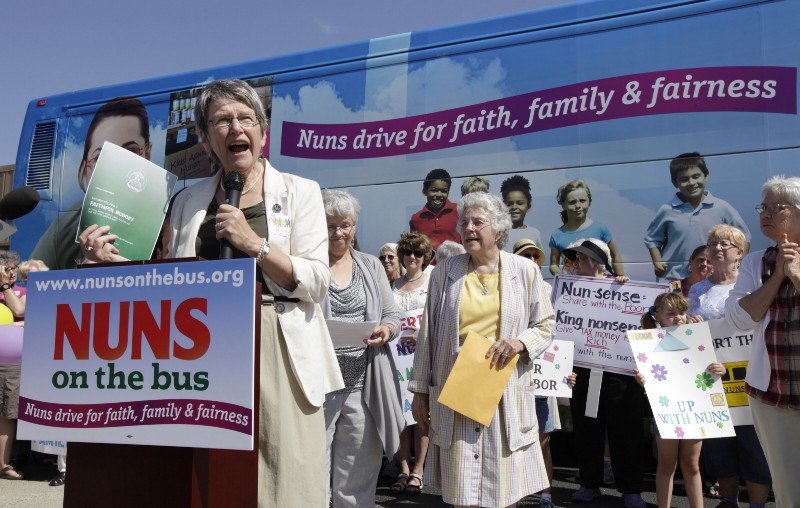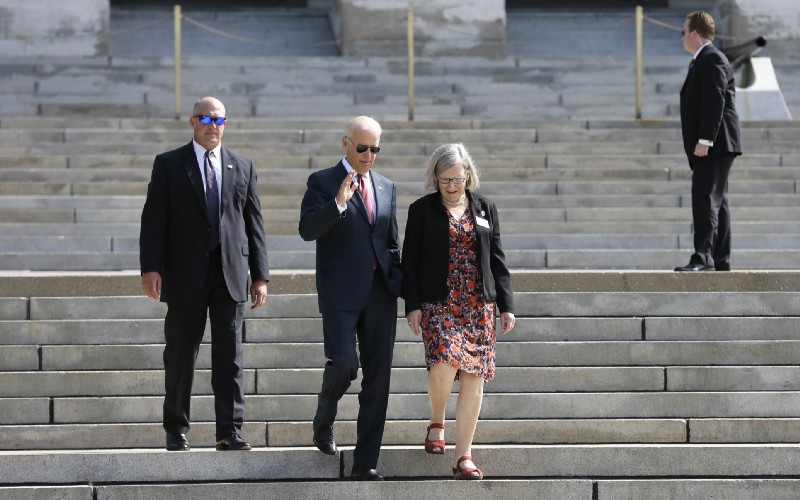This is the first in a series of profiles examining leaders of what is often called the Religious Left, detailing their origins, beliefs, and tactics.
When Sister Simone Campbell pulled me into her office, nestled near the U.S. Capitol Building, she seemed distracted. She was engaged in conversation with an assistant, listening intently as other staffers at NETWORK — the Catholic social justice lobby that Campbell runs — bustled by outside the door. But her eye twitched toward a thick stack of papers piled atop her desk: the newest draft of the Republican Party’s attempt to replace the Affordable Care Act (ACA), released to the public just an hour before.
“Oh, yes,” she said when I pointed it out. She picked it up and flipped through several of its already worn pages, pausing before rattling off a few surprisingly wonky criticisms about the bill. She would later conclude, solemnly, that she thinks it will hurt poor Americans and leave millions without health insurance.
“It’s enough to make your hair catch fire,” she said, sighing as she pushed it aside. Seconds later a warm grin spread across her face, and she turned back to the matter at hand with renewed energy: “Anyway…Hello! Welcome!”
People who have seen Campbell speak are familiar with this enigmatic — and undeniably charismatic — persona, which often flits from serious to downright jovial. Her role in Washington is equally inscrutable. Campbell, a Catholic nun, isn’t the stereotypical D.C. lobbyist, and bears little resemblance to the voguish whiz kids buzzing about various think tanks or lobbying firms. But she also hardly smacks of the stereotypical nun, which Hollywood has long (wrongly) depicted as habit-clad denizens of convents or strict Catholic schools.
That’s because she’s both, and neither — and the unusual mixture is what has made her one of the most effective leaders of the so-called Religious Left.
Campbell’s connection to the ACA, for instance, isn’t just ideological agreement — she was crucial to helping it pass. When the U.S. Conference of Catholic Bishops came out against Barack Obama’s landmark health care legislation in 2010, NETWORK and a group of prominent nuns shocked Catholic leaders across the country by endorsing it anyway. The move was just enough to assuage some skittish Catholic Democrats to endorse the bill, paving the way for its passage. To this day, Obama claims his administration would “not have gotten the Affordable Care Act done” had it not been for the last-minute advocacy of Campbell and other nuns, such as Sister Carol Keehan of the Catholic Health Association.
But that was the Obama Era, already a distant memory in the age of President Donald Trump. Now, as a new health care debate heats up and the Religious Left rises to confront the billionaire Trump, what role is there for a 71-year-old nun-turned-lawyer-turned-activist with a heart for the poor?
A life of faith-fueled activism — and legal training
Campbell’s hunger for activism was sparked during the 1960s, when she used to huddle next to her sister in their Southern California home to watch news reports of the African American Civil Rights movement. She says Martin Luther King, Jr. had an especially profound impact on her, and while he is Baptist and not a Catholic like herself, she resonated with how he merged the pursuit of justice with his Christian faith. By the time she finished her freshman year in college, she formalized that same connection in her own life by beginning the process of becoming a nun, where she would eventually adopt the name “Simone.”
“We’re all social workers, troublemakers, community organizers, that kind of thing,” Campbell said, speaking of her fellow nuns in the Sisters of Social Service, her religious institute. “I’m not so good as a social worker, because I’m not patient enough — I’m way more about ‘take charge and get something done!’”
“I realized power imbalances made me mad.”
It was, in fact, the inability to “get something done” that eventually turned her eye toward public policy. While working as a religion teacher in Portland, Oregon, she participated in an organizing effort for tenants’ rights. The campaign — complete with volunteers, protest events, and public testimony — was exhilarating, but hit an unexpected snag when a local lawmaker rebuked her and others during a demonstration.
“I realized power imbalances made me mad,” she said of the experience. “So I came home and said to the sisters I lived with: ‘I gotta go to law school.’”
Campbell graduated from University of California Davis Law School a few years later, and promptly set about creating a low-cost legal services center to serve the needs of the working poor in Oakland, California. She ran the center for 18 years, working with clients that were almost entirely from low-income, blue collar families. She says the job taught her the “mix of taking the story of real people to legislation,” and found her public voice while testifying before the state legislature on issues such as child support.

“I learned a whole other piece of policy in the process,” she said.
The skills came in handy when she left the legal field to head up her religious institute and begin new forays into lobbying for public policy. It was in the halls of the California legislature that Campbell developed an unusual style of activism that focused not on opposition politics, but on the uniquely personal — and often persuasive — power of religious leadership.
She recalled one instance where she attempted to apply the sociological power of prayer to politics. After learning about a study claiming that some people recovered better from surgery when they knew someone is praying for them, Campbell set about creating a program where lawmakers were assigned a sponsor nun who pledged to pray for them to “be open to the needs of all in California.” Campbell delivered the information — complete with a picture of the sponsor nun — to lawmakers in person. Her visits often triggered unexpected results: State legislators, she said, would respond by offering confessions, and some even burst into tears.
“It was all about relationships,” she said. “It taught me that lobbying is not just about the issue, it’s about the person you’re engaging.”
The rise of a religious “rock star”
Campbell was tapped to head the national-level NETWORK group in 2004, but it wasn’t until the 2010 health care fight that her career caught fire. Elevated by helping pass the Affordable Care Act despite the efforts of U.S. bishops, she and other nuns were heralded as “rock stars” by their fans.
Indeed, nuns were on the rise: By 2012, polls showed the public favored nuns over their male-dominated leadership, and nun-led lobbying efforts were garnering far better results than those led by the U.S. Conference of Catholic Bishops.

But the success came at a cost. In April 2012, just two years after the health care fight, the Vatican — which is notoriously slow to respond to anything, much less current events — suddenly initiated an investigation of the Leadership Conference of Women Religious, the largest group of American nuns that includes Campbell. Vatican officials claimed the inquiry was a response to nuns advocating “radical feminism” supposedly “incompatible with the Catholic faith,” though many American Catholic writers challenged that assertion. Campbell said she believes the move was “in direct response to our winning on health care,” because some saw the victory as undermining the authority of the bishops.
“I didn’t deny [the bishops] were the true teachers of the church on faith and morals, but they certainly hadn’t read the bill,” she said.
But if the Vatican hoped to diminish the acclaim of nuns like Campbell, they sorely miscalculated. The investigation became a classic example of the Streisand effect: The top-down inquiry only heightened Campbell’s profile among left-leaning American Catholics.
By the time the 2012 budget debate began on Capitol Hill, Campbell and NETWORK had enough name recognition to launch an audacious cross-country bus tour to fight against the GOP-sponsored bill, traveling to nine states to speak out against proposed cuts to federal programs that help the poor. The Nuns on the Bus tour, as it came to be called, attracted a flurry of media attention, and Campbell was met with roaring crowds across the country.
“It was the notoriety that got us the bus,” she said.
Some bishops forbade Campbell from speaking in their dioceses — a prohibition that continues to this day — forcing organizers to get creative. Campbell remembered one stop where local volunteers had to change locations at the last minute because a bishop stepped in, eventually settling on a recreation center in a mobile home park.
Twenty-four hours later, more than 100 people showed up.
“In the Christian scriptures there’s this thing that says ‘The stone which the builders rejected, has become the cornerstone,’” she said, quoting the Bible. “So we got rejected, but we’ve also become a cornerstone.”
Campbell’s rise to fame crescendoed that September, when she was asked to deliver a primetime address at the 2012 Democratic National Convention. The request was highly unusual, and possibly historic: Few if any religious leaders who are not politicians have delivered anything other than a prayer at a party convention on either side of the aisle. As far as power plays go, it was a big deal.

But Campbell wasn’t sure it was the right move. She told anxious DNC staffers she would only speak if she was allowed to describe herself as “pro-life” onstage, among other requirements. They readily agreed, but she still had to fight for a speech that wasn’t “political.” Ultimately, the final decision to participate came down to a moment of prayer.
“All these people who wandered into [my prayer imagination] were the people I met on the bus, and the question became ‘What should I do for them?’” she said. “And it was like — speak! It was resounding. It was like an earthquake…Those people needed to be in the hall.”
True to form, Campbell’s final speech consisted mostly of stories about people she met on the tour, each one tied to a specific policy — especially health insurance and food stamps. Protecting those people was “part of my pro-life stance,” she told the assembly, noting “our faith strongly affirms that we are responsible for one another.”
The roaring audience of Democrats — often chided by Republicans for being overly secular and godless — responded with a standing ovation.
Changing hearts in Trump’s America
Campbell has worked to be nonpartisan in the broad sense, but her connection to the political left is undeniable. As she spoke with me in her office, the screensaver on her computer flashed with images of prominent progressive politicians such as Jimmy Carter and the Obama family. She is also well-known to be a favorite of fellow Catholic Vice President Joe Biden, who has appeared on stage next to her during Nuns on the Bus tour stops.
Among fellow leaders of the Religious Left, she’s heralded as an organizing powerhouse. Roughly a week after our interview, Campbell was standing in front of the U.S. Capitol Building, playing emcee to a rotating band of faith leaders and politicians who were there to blast the GOP health care bill. In addition to politicians like Minority Leader Nancy Pelosi, the lineup included Rev. William Barber II, a rising star among progressives who led the Moral Mondays movement in North Carolina and spoke at last year’s DNC.
“Sister Simone is a modern-day prophetess.”
“Sister Simone is a modern-day prophetess,” Barber said to the crowd, explaining that he canceled a trip to be there. “When modern-day prophetess calls…whatever is needed, you drop it.”
Yet Campbell’s approach to activism, or “theory of change,” has mostly remained rooted in a power-focused strategy that strives to reach across the aisle. Since 2012, she has launched a number of different bus tours to get her message out on issues such as immigration and poverty, but she remains dedicated to changing the hearts of lawmakers inside the beltway. She even holds out hope for reaching fellow Catholic Paul Ryan, although she admits connecting with him has become more difficult since he became Speaker of the House.
“I can’t believe that these [GOP lawmakers] are the Stepford Wives, with their bodies taken over by automatons,” she said. “They care, too.”
And then came Trump. After years of working productively with the Obama administration (although she maintains she and the president “didn’t always agree”), last November’s power shift upended Campbell’s entire strategy for making change in Washington.
“I think it is hugely difficult to figure out what’s effective,” she said. “[Trump] has no constraints on policy. He has no policy connections. So it’s not possible to use old political analysis of what matters to somebody.”
But as the rest of the progressive activist structure swings towards hardline advocacy, Campbell is hesitant to shift. Asked if she considers herself part of the “Resistance” movement, Campbell became visibly uncomfortable and voiced anguished ambivalence. She praised the work of “friends” such as Palestinian-American activist Linda Sarsour (“She is fabulous!”), and grinned recalling how she spoke at the Women’s March (“It was fantastic!”). Yet she insisted Hill-focused lobbying is still necessary, and even criticized Indivisible protesters who shouted at Sen. Rob Portman (R-OH) at a recent event where NETWORK was discerning his views on health care.
“We desperately need [Resistance activists] to pull the conversation, but we’re about legislation,” she said. “We lobby with Republican offices — some people in town see that as betrayal. But I see it as nuts for us not to have those connections…It’s not like we only care for poor people in ‘Blue States.’”
“We desperately need [Resistance activists] to pull the conversation, but we’re about legislation.”
That doesn’t mean Campbell and her team are willing to compromise on certain policy positions, though. She referenced a recent instance of going toe-to-toe with staff from Sen. Bob Corker’s (R-TN) office on the minutiae of macroeconomics. The goal, she says, is to push the national conversation back to the poor — which is why her team met with White House officials over the past few months.
She said the decision to sit down with the president’s staff wasn’t easy, but “then I thought: if they’re not connected to anyone, they can drift too far apart.”
The effectiveness of Campbell’s tactics in the Trump era, where bipartisanship is often considered laughable, is anybody’s guess. But her vision may turn out to be a secret weapon for progressives: As Republicans struggle to round up enough votes to pass their health care bill, Sen. Mitch McConnell (R-KY) has sought to rein in wary members of his party by threatening to forge a compromise with Democrats, opening the door for advocates like Campbell to pave a third way.
No matter which way the political winds blow, Campbell remains dedicated to representing the interests of the poor and the lowly. As our interview wound down, she suddenly switched back to her more serious cadence, saying she needed to tell me one more thing. Campbell then reached for a nearby table and presented photos of two people, holding them aloft as she explained how one died due to lack of health care, and the other relies on Medicaid to cope with Down syndrome.
If the GOP health care bill passes, she said, thousands like them will die.
“These are my people,” she concluded, slamming her hand down on the table. “They’re my passion.”
This story has been updated to include Rev. Barber’s full quote praising Campbell.



